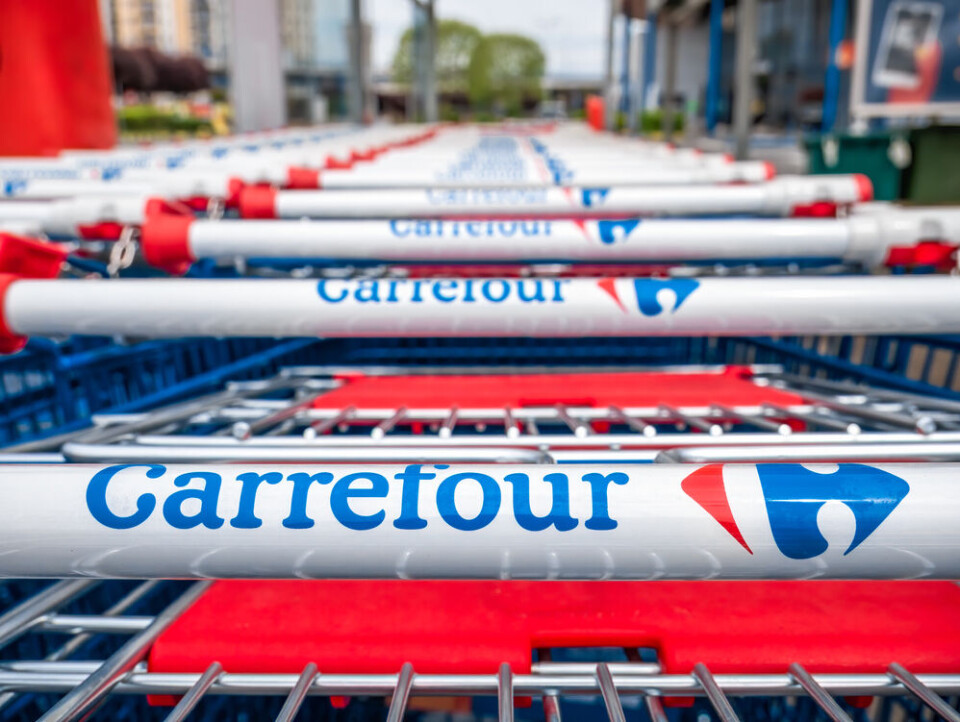-
‘No evidence third party involved’ in deaths of British couple in south-west France
Investigators update The Connexion on Dawn Kerr and Andrew Searle case
-
MPs push to remove low emission zones in France
Critics say the zones penalise lower-income households, but the government has warned abolishing them could cost billions
-
Trump tariffs: Americans in France hit by dollar drop
Europe has said the tariffs will cause the economy to ‘massively suffer’ as France plans retaliation
Third French supermarket to launch basket of cheaper everyday goods
Carrefour will offer 200 everyday items below €2 and freeze the cost for at least 100 days in the latest anti-inflation scheme, as the government's ‘low-cost basket’ idea is rejected

The French supermarket Carrefour has become the latest to offer its own selection of 200 low-cost items, as the government’s ‘anti-inflation’ 50-item basket idea is shelved.
Carrefour CEO Alexandre Bompard announced the plan in an interview with le Journal du Dimanche. The 200 items will be offered at less than €2 each, from March 15. This low price will be frozen for at least 100 days.
Of these items, 100 are considered to be ‘healthy’, and have a Nutri-Score of A or B. These will include yoghurts, eggs, fresh vegetables, bread, milk, and cereal. The other 100 are considered to be ‘everyday’ items, and will also include hygiene products.
Read more: French food nutrition labels to change in line with health advice
The scheme will apply across the supermarket’s 5,945 stores. It is part of Carrefour’s ‘Initiative pouvoir d’achat (Purchasing power intiative)’, amid rising inflation and soaring supermarket prices (figures for February show that food prices have risen 14.5% year-on-year).
‘Low-cost’ 50-item basket idea shelved
It comes after the government’s proposed ‘inflation basket’ idea has been shelved, due to being rejected by most supermarkets.
SME (small business) Minister Olivia Grégoire had suggested the idea as a means to ensure that at least 50 everyday, healthy items remained affordable for consumers, despite rising prices.
Read more: More details revealed on plan for 50 low-cost shopping items in France
However, most supermarkets, including Carrefour and its competitor E.Leclerc, rejected the idea, saying that it was not economically possible.
Mr Bompard, who has been Carrefour CEO since 2017, said: “It was essential that all players could commit at the same time, but with full autonomy of action. The result will be all the more powerful.”
This appears to be a reference to Ms Grégoire’s suggestion, which would – if it had been rolled out – have required supermarkets to act as one, and lower prices on specific items, due to government legislation, rather than voluntary action. Mr Bompard was opposed to a government-mandated basket.
Economy Minister Bruno Le Maire had called on supermarkets to “make an effort” when it comes to financial margins, in a bid to mobilise brands to act amid rising prices and reduced purchasing power for shoppers in France. This was a more popular idea.
Mr Bompard said: "We have found a very good agreement with the minister. He decided to give everyone the freedom to define the operations of their choice.”
Carrefour posted returns of €42 billion last year, with a 4.4% rise in its food business. The new basket plan will cost the company "several tens of millions of euros", Mr Bompard said.
The ‘basket’ of 200 capped-price items is not the first anti-inflation measure the brand has brought in. It had already created a basket of 15 fruit and vegetable items sold at €1 or less, which saw “very good results”, said Mr Bompard.
He said: “The supermarket sector saw the inflationary risk very early on….but we are crossing an additional threshold with these 200 products with a low price, which will be frozen for 100 days.”
‘Red March’ and beyond
March to July is expected to be an even more difficult time period for supermarket prices, after the annual negotiations between suppliers and brands ended on March 1. Supermarkets warned of a ‘Red March’ after some suppliers called for a 10, 15, or even 20% rise in prices.
Read more: Why food prices are at risk of rising again in France from March
Mr Bompard said that the next few months could be even more difficult for shoppers, due to the end of negotiations, which the CEO criticised as being “a new violent shock for the most fragile households”.
He predicted that “the level of food inflation will remain in double digits until this summer, probably rising above the current level”.
However, he said that Carrefour had intentionally added products with the Nutri-Score A or B in a bid to “not sacrifice quality in the fight against rising prices”: He said: “We are doing everything to ensure that inflation is not synonymous with a decline in the quality of food.”
Other supermarkets
Carrefour is not the only brand to introduce anti-inflation measures of its own accord.
Système U is also among those to have brought in offers, including its selection of ‘150 products at cost price’ for the foreseeable future, it said. This was introduced at the start of February.
Last year, Monoprix also announced plans to freeze the prices of 300 items in its own-brand range, while E.Leclerc has also previously frozen the prices of more than 200 products.
Casino and Lidl are also among those to have brought in anti-inflation offers.
It comes as a new type of low-cost supermarket, named Toujust, is set to launch in France in March. It is aiming to sell products by up to 5-10% cheaper than typical supermarkets by working directly with producers.
Related stories
The cheapest supermarket in France revealed as others push deals
Inflation in France: which foods have risen most, will rises continue?
List of supermarket foods set for more price rises in France
Which supermarket in France is the cheapest? Tests show 17% difference
























